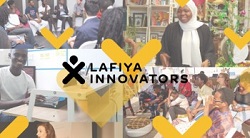
Headquarter activities
Basel | Innovative health startups in Senegal and Ghana receive global support
By 2030, it is expected that 85% of the world's population will be living in Low and Middle Income countries (LMICs). The substantial gap between the need for healthcare and the level of access in these countries has been well established over the years. In 2015, the World Health Organisation (WHO) estimated that over 400 million people in LMICs lack access to essential health services — including family planning, antenatal care, skilled birth attendance, child immunization, antiretroviral therapy, tuberculosis treatment, and access to clean water and sanitation. The same report states that 5.9 million deaths occurred in children under 5 years of age, with a disproportionate concentration of deaths occurring in LMICs. At the same time, rates of heart disease, cancer, diabetes, and other noncommunicable diseases (NCD) in LMICs are increasing faster, in young people, and with worse outcomes than in wealthier countries.
More than ever we need innovative solutions addressing the Sustainable Development Goal 3 and to do so we need to collaborate, share knowledge and expertise, and build bridges globally.
Impact Hub Basel has created one such solution—Lafiya Innovators, a support program for startups, jointly funded by Swiss Agency for Development and Cooperation (SDC) and Fondation Botnar. Developed by Impact Hub Basel, and implemented in collaboration with Impact Hub Accra (Ghana), Impact Hub Dakar (Senegal), and the African Health Innovation Centre, the program supports ambitious entrepreneurs throughout the venture lifecycle, from determining a basic business model to completing the due diligence process necessary for fundraising. The name "Lafiya" has been chosen because it means "health and wellness" in Hausa, a local dialect present in both Senegal and Ghana.
Aiming to deliver impact at scale, the program focuses in particular on technological innovations and systemic solutions targeting underserved populations, including adolescents (and children) and women. In addition, the program seeks to strengthen the local health ecosystem and health entrepreneurship capacity by bringing together and engaging a strong community of health stakeholders, both locally and globally.
Tailored to fit the maturity level of the startup ecosystem in each city, there are two tracks:
- The Starter Track in Dakar, Senegal, is aimed at ideation stage startups. The goal of this track is to support them in validating their business model and minimum viable product (MVP) in order to launch to market.
- The Growth Track, in Accra, Ghana, is aimed at pre-seed stage startups. The goal of this track is to prepare the selected startups by supporting their due diligence efforts for their first pre-seed funding opportunities.
What do the startups gain from participation? - Six months of direct incubation support from Impact Hubs Basel, Accra, and Dakar – locally rooted, globally connected
- Six months of direct health innovation advisory and networking support from the African Health Innovation Centre
- An all-expenses paid one-week trip to Switzerland for Immersion Week, including ecosystem tours and participation at the Global Health Forum in Geneva
- Modest financial support for startups throughout the six-month incubation period
So, let's meet the six dynamic startups selected for the first edition…
Gricd offers active battery-powered, mobile cooling boxes for temperature sensitive medication, with real-time tracking during storage and transportation.
Home Mobile Nurse improves access to healthcare by bringing much needed care directly to patients' homes, while also increasing employment opportunities for nurses.
Verifie offers young people confidential and affordable access to counselling, testing and treatment for sexually transmitted infections (STIs), including convenient app-based booking and consultation.
NoWelli offers healthy, balanced meals and improved awareness of nutrition to help fight against non-communicable diseases.
SenVitale provides health passports in the form of portable QR codes, allowing a quick and secure method to access personal medical files in local languages.
Picaaré provides a system that brings pharmacists and patients closer together in order to combat the dangers of street drugs.
You'll have a chance to meet these entrepreneurs in person on March 18 during the SDC Health Network face-to-face meeting at Impact Hub Basel. The startups will be flown to Switzerland for one week, immersing themselves in the Swiss health ecosystem, learning, networking and exchanging ideas with others.
Related resources
https://basel.impacthub.net/lafiya-innovators/
Author
Connie Low, Co-Founder and Sustainability Expert
Impact Hub Basel
connie.low@impacthub.net
